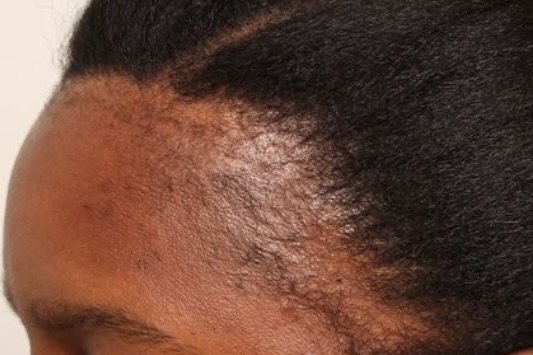Frontal fibrosing alopecia (FFA) is a form of scarring hair loss that predominantly affects women, especially those postmenopausal, though it can also occur in men.
Characterized by a progressive recession of the hairline, most often on the forehead and temples, FFA can be distressing both physically and emotionally.
As awareness grows, so does the need for accessible information about its symptoms, causes, and treatment options.
FFA is classified as a type of lichen planopilaris (LPP), an inflammatory condition that targets hair follicles. The condition leads to permanent hair loss due to scarring, and over time, it may also affect eyebrows, eyelashes, and body hair. Early signs typically include redness and scaling around hair follicles, along with a distinct band-like pattern of hairline recession. Many patients also report itching or burning in the affected area.
The exact cause of FFA remains unclear, but experts believe it involves a combination of genetic, hormonal, and autoimmune factors. Some studies suggest a link between hormonal changes, such as those that occur during menopause, and the onset of the condition. There has also been speculation around the role of certain skincare ingredients like sunscreens, though no definitive link has been established.
Because FFA causes permanent follicular damage, early diagnosis is crucial to prevent further hair loss. Dermatologists usually diagnose the condition based on clinical examination, scalp biopsy, and dermoscopy.
While there is no known cure for FFA, a variety of treatments can help slow its progression and manage symptoms. Topical corticosteroids and calcineurin inhibitors are often prescribed to reduce inflammation. Oral medications such as hydroxychloroquine, finasteride, or dutasteride may also be used to inhibit further hair loss. In some cases, low-level light therapy or platelet-rich plasma (PRP) treatments are considered to support scalp health.
Psychological support is another vital aspect of managing FFA. Hair loss can deeply affect self-esteem and mental health, making therapy, support groups, and patient education essential parts of treatment.
Increased awareness of FFA is helping more people seek early diagnosis and access the care they need. Though the journey with frontal fibrosing alopecia can be challenging, timely treatment and community support can make a significant difference.





